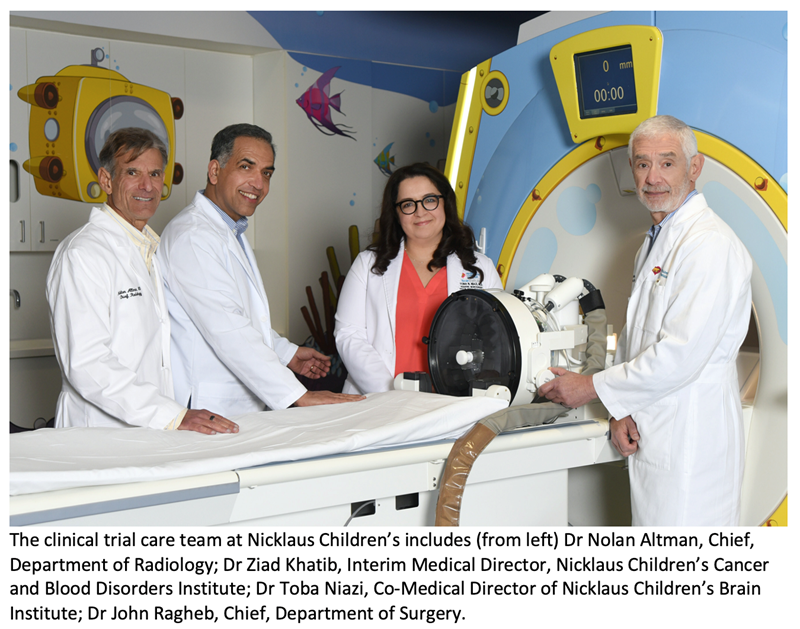Nicklaus Children’s Hospital to Study Low-Frequency Focused Ultrasound Therapy in Aggressive Brain Tumors
 Nicklaus Children's Hospital is participating in a Phase I clinical trial studying the role of a new technology called low-frequency focused ultrasound (LoFU) in the care of children with a lethal type of brain tumor that forms within the brainstem.
Nicklaus Children's Hospital is participating in a Phase I clinical trial studying the role of a new technology called low-frequency focused ultrasound (LoFU) in the care of children with a lethal type of brain tumor that forms within the brainstem.
Diffuse intrinsic pontine glioma (DIPG) also now known as diffuse midline glioma (DMG), is an aggressive tumor that occurs within the brainstem and affects approximately 300 children annually, most of them between the ages of 5 and 9. Despite advances in treating other forms of brain tumors in children, DIPGs remain the most lethal brain tumor with a median survival of less than one year. DIPG tumors infiltrate the brainstem and are in a surgically inaccessible location. In the hands of an experienced team, they can be biopsied safely, with no harm to the patient. Adding to the clinical challenges presented by DIPG tumors, they are difficult to treat with chemotherapy, due to the protective brain-blood barrier that shields the brain from many pathogens.
"We are constantly seeking new treatment options to advance the care of children with this devastating diagnosis," said Dr Toba Niazi, Co-Medical Director of the Nicklaus Children's Hospital Brain Institute and Director of the hospital's Division of Neurosurgery. "It is our hope that through this clinical trial, the low-frequency focused ultrasound will temporarily open the blood-brain barrier around the affected area of the brain and allow chemotherapy to gain direct access to the tumor and provide children with a chance for a cure."
Other participating hospitals include SickKids Hospital in Toronto and Children's National Hospital in Washington, DC. The trial is open to children ages 5 to 21 years old who have been diagnosed with this type of tumor.
Patients receive treatment within the MRI suite, while the child is wearing a frame device on their head that resembles a helmet. This device helps deliver ultrasound waves through the brain. Chemotherapy is then concurrently administered via intravenous injection. Researchers are hopeful that the addition of low-frequency focused ultrasound will help the chemotherapy agents to better reach the tumor by disrupting the blood-brain barrier that typically protects the brain from some agents within the blood stream. This study is performed in three cycles spaced out every four to six weeks.
Nicklaus Children's Hospital, through its Brain Institute and Cancer and Blood Disorders Institute is one of only a few centers in the nation with extensive experience in caring for children with complex brain tumors. The hospital's Neuro Oncology Program offers the latest innovative therapies, including immunotherapies, individualized treatment plans, combined with compassionate and comprehensive care in a multidisciplinary care setting. The Brain Institute and other programs of Nicklaus Children's Hospital are dedicated to ensuring that no child should have to leave Florida to receive advanced medical care.